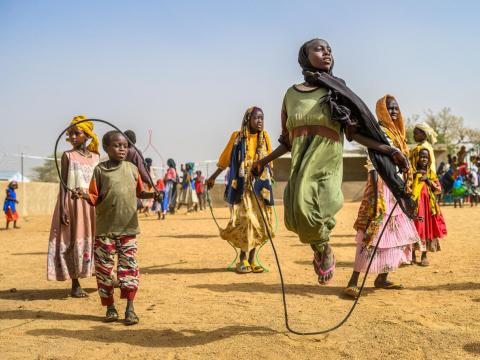Will children and young people be a priority in the EU’s external action?

Each year, on 12 August, International Youth Day is an opportunity to take stock of the situation of young people globally: their needs, demands and place in the current policy landscape. With the EU’s governance in re-building mode after June’s EU elections, this year’s International Youth Day carries a series of uncertainties and open-ended questions.
In a changing political context, will the EU continue to champion the rights of young people? And which young people will be considered a priority?
Looking back: five years of key developments
Looking back at the past five years, the EU reached several important policy milestones advancing the rights of both young people and children, in Europe and globally:
The EU Strategy on the Rights of the Child was created for the protection and promotion of the rights of all children, laying a foundation for future child and youth-focused engagements. The EU Youth Action Plan 2022-2027 followed shortly after, specifically targeting young people outside of Europe. It includes a strong focus on empowering young people as agents of change.
The EU put this into practice through the fresh EU Youth Sounding Boards, who advise both EU delegations locally in partner countries, and the Commissioner for International Partnerships in Brussels. The Council of the European Union was also actively involved, through Council Conclusions and the newly published update on the EU guidelines on Children and Armed Conflicts.
Every step of the way, civil society was present: bringing information from the field and the children and young people themselves, supporting with technical expertise and creating much-needed political attention and interest. The most recent example is the collective op-ed from the EU offices of Plan International, Save the Children and World Vision, welcoming the updated guidelines on Children and Armed Conflict.
Looking ahead: only some “youth” included?
It is important to acknowledge and celebrate these milestones, and looking ahead to the next five years, there is room and reason for optimism, hoping the EU will continue its strong commitments. It is also, however, a time of concern, as child rights are at risk of being overshadowed by other priorities.
Globally, young people are becoming an increasingly targeted and prioritised group: as agents of change, peacebuilders and climate change actors. Young people will build or break the economies of their countries, and very likely form the next waves of migration to the EU. These young people – sometimes as old as 30 – often occupy the same political space in action plans and sounding boards as children aged 0-18.
It is time for the EU to recognise and champion both groups. This requires concrete actions: age-segregated data, programming targeting specific needs, and sounding boards with the safeguarding capacity needed to include children. Through the new and ambitious EU Child Participation Platform, the EU has shown that it is capable of including adolescents – but not yet externally.
The challenges, however, go beyond the unclear definition of “youth”. The new political guidelines from European Commission President Ursula von der Leyen are creating doubt about all of the EU's external engagement with young people. They focus on competition rather than on cooperation – development, humanitarian and nexus sectors do not seem to feature high on her political agenda. Similarly, a leaked draft briefing note to the Directorate-General for International Partnerships outlines a new direction for the EU's external engagement, focused heavily on economic development rather than human development.
Under this narrative, young people globally will be prioritised by the EU in their capacity as workers, voters and migrants. But will young people, and especially children, be regarded as the rights holders they are – beyond their added value to the economy? Will adolescents be included in “youth”? Will the strong child-rights focused narrative towards children in the EU, also benefit the children and young people in the EU's partner countries? This is still uncertain.
In the next five years, as advocates of children and young people, we will therefore have the duty to not only ask “if” the EU will continue to champion young people, but “who” it will support and “how” it will do so. On International Youth Day, and on every other day.
Freja Dohrn Ellefsen, Policy and Advocacy Adviser at World Vision EU Representation